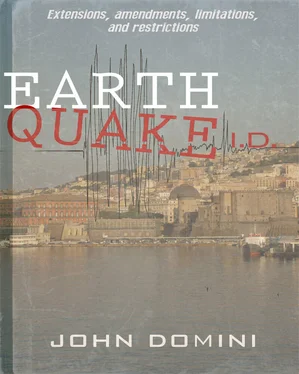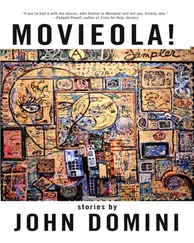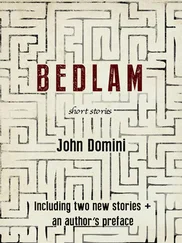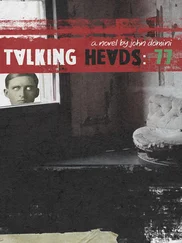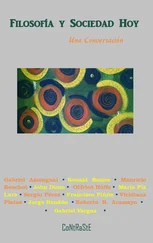“It’s Paul,” she said. “It’s about Paul.”
Jay surprised her with his look, the gentlest she’d seen from him since they’d come out of their hiding place at DiPio’s clinic.
“It’s all about Paul,” the father said. “These people, somehow they must’ve heard what happened. After I was hit.”
“Big news.” Evenly, she met his gaze. “You can’t expect something that big to remain a secret.”
With that, fumbling with one hand over the seat-back, the husband made an attempt at their private gesture. Reaching, probing through her skirt, he tried to pinch the waistband of her underwear. This was a line of communication established during their first meetings, when they’d cuddled beneath the bleachers alongside Jay’s football practices. In those days it had thrilled her to be taken hold of so intimately, and she would give him back the same, her own fingers ducking beneath his padded shorts to tug lightly at his jockstrap. In those days they’d been twin Pinocchios, each finding the secret that turned the other to flesh and blood.
Tonight Barbara twisted out of reach, squeaking across the vinyl. She broke into the same laugh, harsh and dismissive, as before. “My mother used to tell me about Naples,” she said. “She used to say that around here, sooner or later everybody knows your business.”
As if she did it everyday, she hooked a couple of fingers over the gun barrel before her. She made the trooper lower his weapon.
“This kind of thing,” she went on, “this tonight, I’ve seen it before. The church work I’ve done, I’ve seen it plenty of times. They think what Paul did was a.…”
Then Barbara noticed Kahlberg, the way he was looking her middle child. That shut her mouth, the calculation in the man’s stare.
The officer never gave his phone a glance, as he folded it and slipped it back under his flaming jacket. “Apparently,” he began, “there was a video.”
A lepers’ city, a city full of crooks, a city for the end of everything…no. The Naples Barbara encountered over the next couple of days proved impossible to label and file away. At times it did seem a city of prayers. But more often she could be certain only of the appearance of prayers.
You knew the prayers by their empty husks, clinging to the walls of chapels and shrines. The things littered the old downtown churches, the ones that remained open. As soon as Barbara ducked into the sanctuary, navigating another doorway marbled with dust and braced by scaffolds, she’d spot the offerings on the walls, the ojetti votivi . Also hand-lettered notices lurked amid the ironworks of reconstruction: OJETTI VOTIVI . Where you found a church, you found a shop, supplies for the faithful. In there, among crucifixes and medallions, you could buy a piece to represent whatever prayer you had in mind: a miniature in low relief, plated with silver or gold. There were broken hearts, small as half a pinkie or as large as two spread hands, and sacred hearts crowned in flame. Also the heart as muscle, anatomically correct. Here was a leg, there a head, there a household animal, or (its lines as sharply drawn as if lifted from an ad for medical supplies) a syringe. Plus every shop offered the all-purpose clasped hands. These surrogates came with small hooks and nail holes, the better to be hung onto a reliquary, or tacked into the plaster of the chapel wall. The offering could linger for years, after that, growing as dirty as the streets outside. In the emptier chapels Barbara spotted graffiti too, beside these single-use icons. In one case she made out a date back in the previous century, scratched beside a few desperate words. The letters had gone black with accrued grime — something like the resentments built up over a long marriage.
The mother had good reason, over these few days, for going back into the breathless and rackety alleys down at sea level. She had obligations that got her out of her mansion on the hill. Now that was a puzzle, the Lulucitas’ apartment, ten rooms and two balconies as a throw-in on her husband’s deal with NATO and the UN. Plus anyone who’d gotten over the jetlag could see at once that the neighborhood was far better than the one in which the man had been hit. Barbara could see it the very next morning, as she fell into place among the commuters heading for the funicular. Nonetheless she rode down to the center, the original city. First she had her appointments with the bureaucracy, functionaries whose job it was to confirm that the face before them, flesh and powder, was the same as in the photo on the new I.D. Another day she had paperwork with an Italian bank and the American Consulate, and when she was done with those errands she could come up with something else. On one trip she went to the central police station and registered her picture and fingerprints, hers and the children’s. This meant the kids were with her that time, down from the protected heights of the bourgeoisie, and so the family made only a single stop for prayers. A prominent cathedral lay a block from the station.
“You know Mama,” John Junior explained to the girls, “she’s always got to find the Duomo.”
But when Mama descended into the centro alone, she had her choice of churches, outside of five or six that had been shuttered and padlocked following the quake. These always gave her pause, the edifice still consecrated and yet vacant. Their porticos were blocked with sawhorses, wood and iron both, then double-x’d with ribbons of orange plastic. The off-limits sign bore no church insignia but rather a government stamp, machine-black. Barbara suffered a chill the first time she faced one of those, during these confusing couple of days. She shivered, she blinked, and then she visited a travel office. She asked for the agent who spoke the best English.
The mother learned that the airlines preferred twenty-one day notice, in order to guarantee the best connections and a reasonable price. But on the other hand there were flights to New York every day.
Of course she couldn’t make reservations till she had a better idea when Jay’s mother was arriving. Grandma Aurora never gave a thought to the extra expense of last-minute travel, and there was always the chance that she’d wait till after Fourth of July. The old woman loved those fireworks. She would’ve flown all five kids in and out of Manhattan just for the night of the show, she was such a doting grandmother. Which was precisely what Barbara needed, while she left the country to make divorce arrangements. During recent Christmases and birthdays Barb had bit her tongue, fighting down the impulse to snap at Aurora over how she spoiled the children. But that same sort of lavish indulgence would be good for John Junior and the others, briefly, after Mom and Pop shared the bad news. Sure it would, briefly; Jay saw the logic too. The husband too felt that they should wait for his mother to join them, in these vast and airy new digs, before he and Barbara “hit,” as he put it, “some kind of point of no return.”
Husband and wife had had this conversation maybe an hour after the family at last clambered out of their NATO ride; it took that long for Jay and Barb to get some time alone. But Barbara had no trouble reiterating, quietly but firmly, what she’d announced at DiPio’s clinic. The Jaybird took it with the same hurt as before, with the same question as before. “Why?” he asked. But as soon as Jay understood that Barbara intended to hold off taking action until Aurora arrived, he’d agreed. For a moment he’d been puzzled, fingering the gauze over his temple: “What does my Mom have to do with…?” But then he’d clapped a hand across his mouth, audibly. He’d narrowed his eyes and nodded.
Читать дальше
